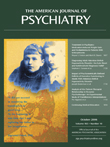Ethical Concerns Regarding Olanzapine Versus Placebo in Patients Prodromally Symptomatic for Psychosis
To the Editor: I am concerned that the article entitled “Randomized, Double-Blind Trial of Olanzapine Versus Placebo in Patients Prodromally Symptomatic for Psychosis” (1) lacked discussion regarding the ethics of treating young (average age=18.2 years) and nonpsychotic patients with the neuroleptic olanzapine for 1 year.
The authors anticipated this problem, and, as they point out, in prior studies 46%–80% of those labeled “prodromal” never develop schizophrenia after up to 2 years of observation and were probably false positives (p. 797). In their study, 16 of 29 participants (55%) in the placebo group never became psychotic after 2 years. We should, therefore, expect that approximately 17 of the 31 (55%) subjects who were given olanzapine were also false positives. More than one-half of the patients who were prescribed olanzapine were exposed to it unnecessarily—at doses ranging from 5 to 15 mg/day.
In addition to the patients’ average weight gain of 19 lbs, I am concerned with what other biopsychosocial repercussions there were for these young men and women after they were placed on the neuroleptic, without a clear indication, for a year. Isn’t our first and foremost obligation to “do no harm”?
1. McGlashan TH, Zipursky RB, Perkins D, Addington, J, Miller T, Woods SW, Hawkins KA, Hoffman RE, Preda A, Epstein I, Addington D, Lindborg S, Trzaskoma Q, Tohen M, Breier A: Randomized, double-blind trial of olanzapine versus placebo in patients prodromally symptomatic for psychosis. Am J Psychiatry 2006; 163:790–799Google Scholar



